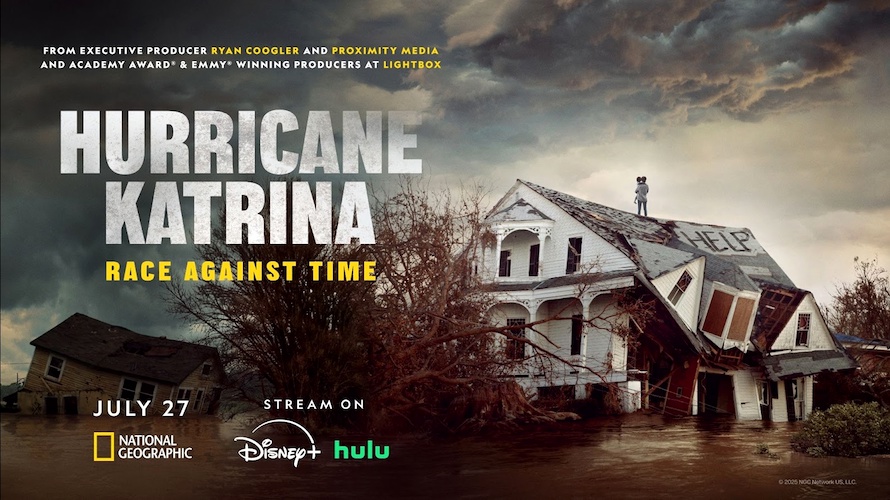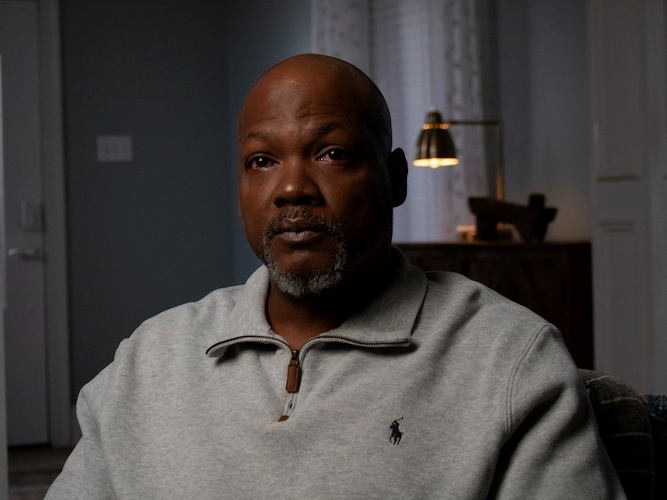Telling the Story Right: Inside Nat Geo’s Hurricane Katrina Docuseries
As the 20th anniversary of Hurricane Katrina approaches, National Geographic’s five-part docuseries, Hurricane Katrina: Race Against Time, reexamines the tragedy through firsthand accounts and a long-overdue historical reckoning. Directed by Oscar-nominated documentarian Traci A. Curry (Attica), the series draws from a vast archive and new interviews with survivors, first responders, and community leaders. Among them is Shelton Shakespear Alexander, a poet and Katrina survivor whose lived experience and footage captured during the storm help shape the emotional core of the series. I spoke with both Traci and Shelton about what it meant to revisit such painful memories, how the media’s narrative failed New Orleans, and what they hope viewers take away as climate disasters continue to disproportionately impact marginalized communities.
Alex: Anyone born after the year 2000 probably has some mental image of Hurricane Katrina. But this series not only expands that, it changes that. Traci, what was your biggest goal in terms of curbing misconceptions about Hurricane Katrina?
Traci A. Curry: Yeah. I think one, a lot of the things we explore in this series—particularly the harm caused to people in New Orleans—weren’t created by Hurricane Katrina. They were revealed by Hurricane Katrina. One of my goals was to show how some of the systems and institutions that invisibly restrict and harm people’s lives became manifest during Katrina.
You see the connection between poverty and the ability to get to safety. There’s always been that question: “Why didn’t people just leave?" But that’s not a simple question. Class and poverty had a lot to do with it. I wanted to make those invisible threads very clear—how Katrina exposed and exacerbated them.
The second thing is, I remember watching the news and feeling unsettled. As we show in Episode 3, the coverage began to morph into a portrayal of New Orleans residents as if they’d descended into a subhuman, animalistic state. Even then, something about that didn’t ring true to me.
So we were very intentional about allowing the people who experienced it to tell their own stories—to correct those narratives. Because what was extraordinary was not chaos, but the way these close ties of kinship and community did not break during the worst moments of people’s lives.
Alex: Shelton, for you—20 years later, I imagine there are moments you still can’t escape and others you may have pushed aside. Was there anything that came back viscerally while working on this?
Shelton Shakespear Alexander: Yeah. It’s always on repeat in my head. Every anniversary, it comes up again. I worked for 13 years teaching at a school, so it stayed with me. And my poetry, the way I write and recite it, I kind of relive it already. The people I lost—who were instrumental in my life—I just can’t get away from it.
But I also got to see and hear some new stories through this. Heartbreaking stuff. At the beginning of Episode 3, we were watching together, and just seconds in I was ready to break down. You don’t know what everybody else has been through. And I know everybody wants to share their story, but it’s tough—they had to go through so much footage.
I guess I always knew I’d have to do something with it so people could see it. I’m just glad I was in the right place with the camera so people can not only hear my words but see what we lived. I hope it helps someone. It’s from the heart.
Alex: One of the themes, especially around Episode 3, is the way media coverage spun the story inaccurately. Since this is a five-part media event, and Nat Geo is a trusted name, how did you feel about how this came together? Does it reflect what really happened?
Shelton: Oh, definitely. Over the years, I’ve been in other documentaries. People kept finding me. But with this one, the way they put it together, the questions Tracy asked—we were comfortable enough to really talk.
Even I learned things I didn’t know. Hearing the other stories, it took me back. It’s tough to watch. I’ve only gotten through three of the episodes so far—I’ve been shaking. The other two already got me there, so I’ve been taking them slow.
Alex: Traci, how long have you been working on the project, and how did you take care of yourself mentally while working on something so heavy?
Traci: It was about 18 months for me, start to finish. And I’ll say this—I’m here representing a team of people. We were all in the footage and interviews together. We supported each other.
But also, this was a profound trauma for Shelton and the others. So for me, if they could have the courage and grace to revisit that and share it, the least I could do is sit with them in it.
I've wondered if I have some suppressed stuff I need to work through, but I also feel like it’s right and appropriate to feel unsettled by this. There should be something that sticks in your spirit after seeing this. Mostly, I’m just really grateful to Shelton and everyone who had the courage to go back for the sake of truth.
Alex: Last question for both of you—20 years later, climate change hasn’t stopped. FEMA is still under scrutiny. What do you hope audiences take away from this series?
Traci: That most recent flood—it was devastating. And we were actually in New Orleans premiering the series when it happened. Shelton and others really understood what those people in Texas were going through.
It was intentional that this series not feel like a historic relic, but something that’s in conversation with where we are now. These extreme weather events, exacerbated by man-made environmental impacts, keep colliding with infrastructure that wasn’t built to handle them. And the people most vulnerable suffer most.
After Katrina, FEMA took some lessons. They even began to incorporate equity into disaster response. That word’s become politicized now, but it’s about care and accountability. We need both. We need to ask why systems fail, and how to repair and make restitution for the people affected.
Shelton: Yeah. It’s a rough time right now. I’ve never felt more uncertain. I’ve always been optimistic, even knowing the suffering my people have endured. And during Katrina, color didn’t matter. Nobody cared about that. Humanity came first.
But now, I worry where we’re headed. With FEMA’s lack of response… if we hadn’t had warning with Katrina, more people would’ve died. We’re supposed to be getting better, but it seems like we might be getting worse. I just hope we cut all this division out, man. There are going to be more storms. We can’t be focused on color or politics. We have to help each other, regardless.
Through raw testimony and urgent storytelling, HURRICANE KATRINA: RACE AGAINST TIME revisits a catastrophe that was far more than a natural disaster—it was a systemic failure, magnified by inequity. Thanks to the work of Traci A. Curry and the lived truth shared by Shelton Shakespear Alexander, the series not only documents history—it corrects it. The five-part documentary premieres tonight on National Geographic and streams July 28th on Disney+ and Hulu.





